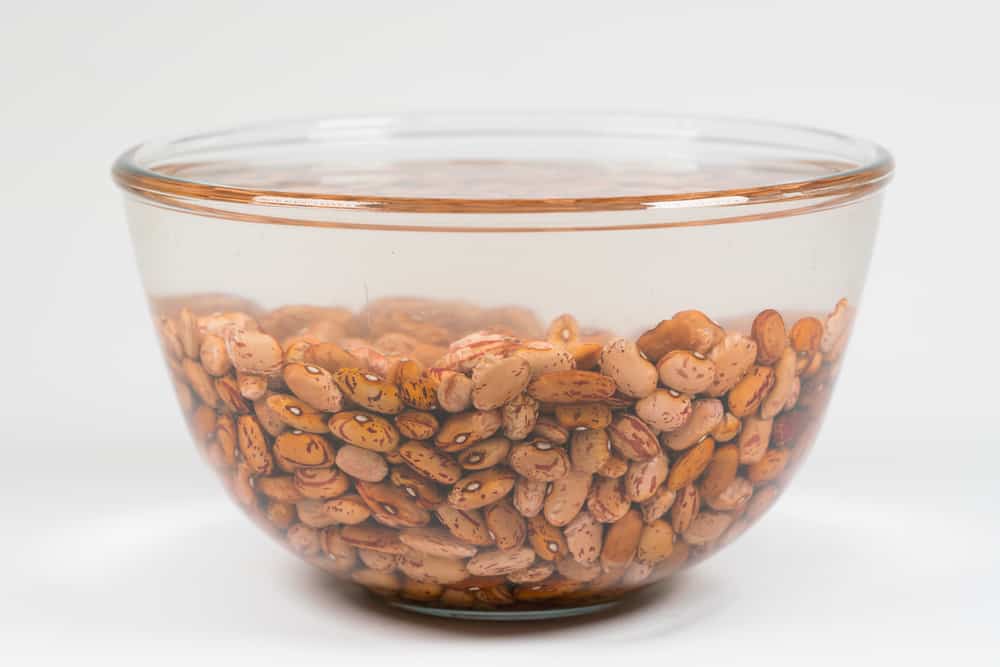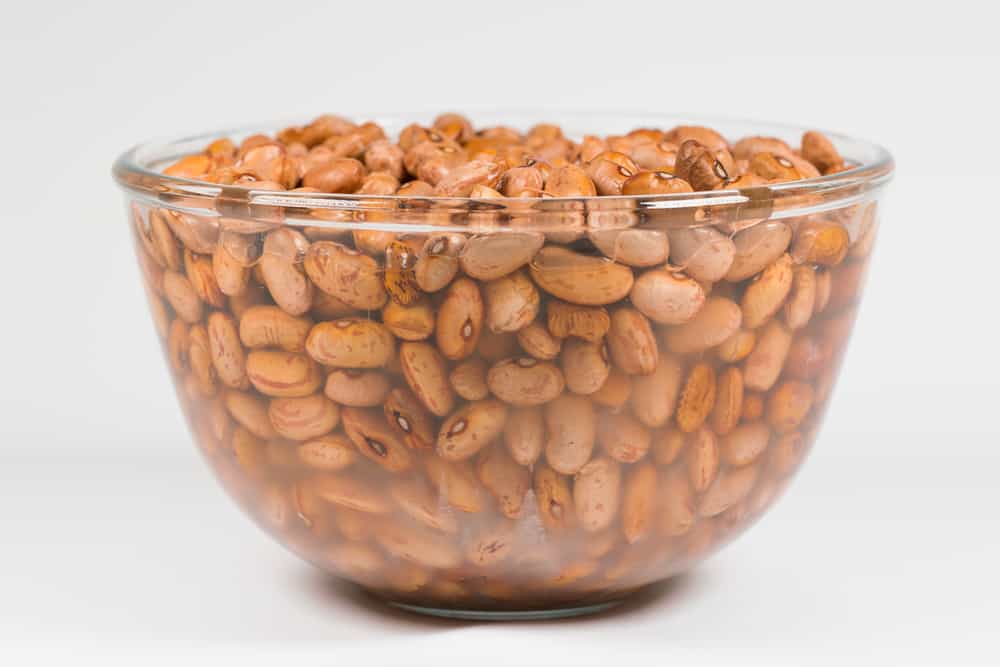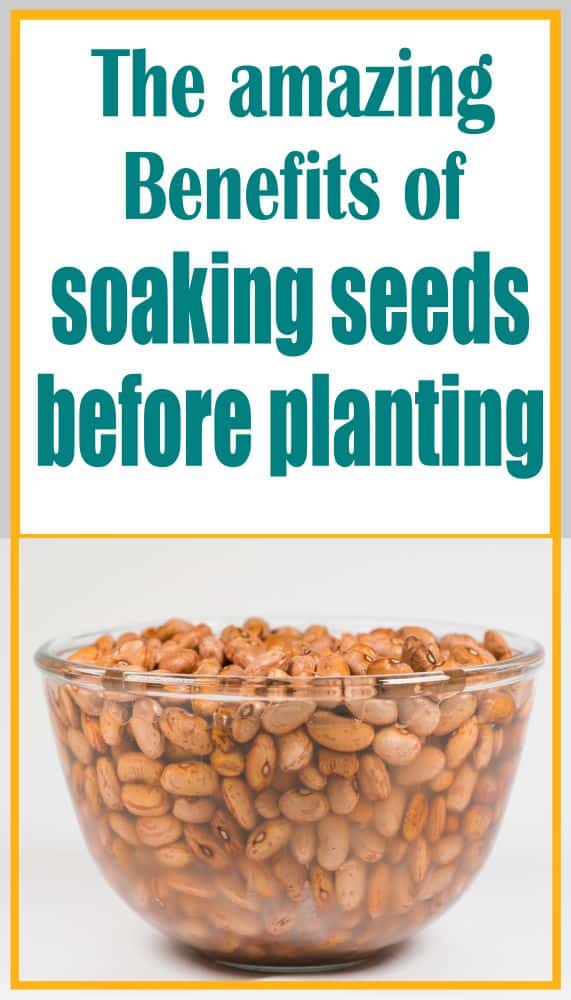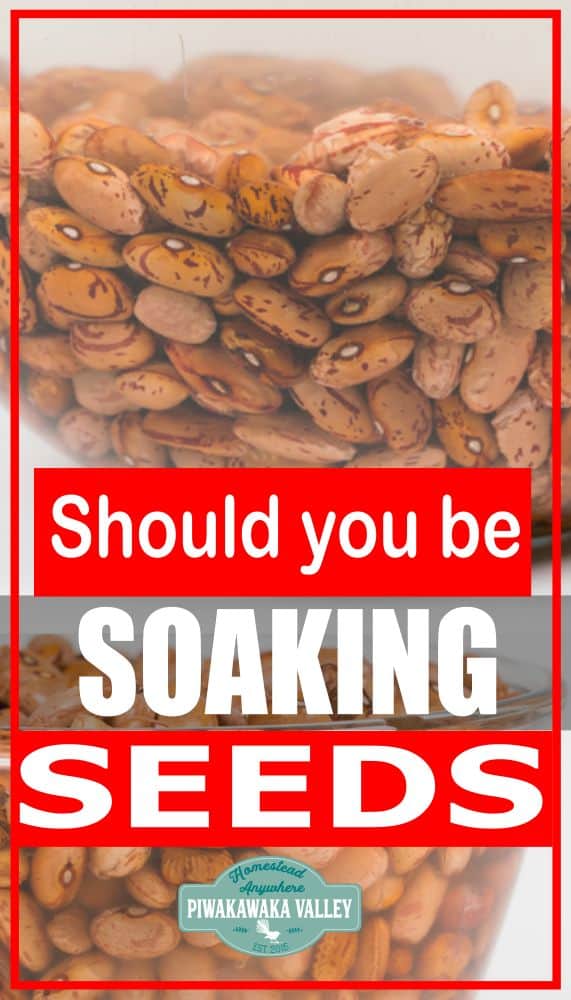This post was most recently updated on March 10th, 2021
Soaking seeds before planting is an old fashioned, traditional method that many generations before us have used to speed up and improve seed germination.
Please read: This information is provided for educational purposes only and is not intended to treat, diagnose or prevent any disease. We encourage you to make your own health care decisions in partnership with a qualified health care professional.
This post contains affiliate links, this means at no extra cost to you, we make a commission from sales. Please read
our Disclosure Statement
Why do you soak seeds before sowing them?
Seeds are designed to carry the next generation of genetic material and they are essential to the survival of the species.
Because seeds are so important to plants, the plants do everything they can to keep them safe and protect them against the elements, being crushed or being dissolved in someone’s stomach.
Seeds will usually be formed at the end of the growing season, and they have to survive the winter before starting to sprout in spring as the weather warms up.
When you take all this in to consideration, you can see that seeds are usually very durable, and actually to sprout, they need some help breaking down that tough coating on the outside to let the tiny insides germinate and escape. Soaking seeds can help breakdown that tough coating and tell the seed to start to grow.


How do you soak seeds for planting?
Soaking seeds for planting is really very easy. All you need is a bowl or jar to place your seeds in and some hot, but not boiling water.
Simply place your seeds in the bottom of the bowl or jar and add 3-4 times as much water. Then place them on your countertop to soak.
How long do you soak seeds for?
It does depend on the size and type of the seed, as well as how hot the water is.
Hotter water will soak through faster, but too hot can cook the seeds which will kill them and prevent them from growing.
Acidic water will soak seeds faster as well, and for seeds from the inside of berries or fruits that are used to being eaten, this may be a helpful tip.
To acidify water for soaking seeds you can add a couple of tablespoons of coffee or 1/2 a teaspoon of white vinegar to a cup of soaking water. If the water is too acidic it can affect the seeds germination.
The answer to how long do you soak seeds for is really, until the seeds are hydrated, but before they start to ferment or rot. Usually for smaller seeds this is 6-8 hours and for larger seeds like beans or corn it is more like 12-14 hours.
Ideally, you would not leave any seed longer than 24 hours to soak before sowing them.
What happens to seeds when you soak them?
Soaking seeds before planting them helps break down the outer coating and rehydrated the inside of the seed.
This will allow the sprout to form faster meaning you get faster germination from your seeds.
Does soaking seeds before sowing really improve seed germination?
If you ask any old timer that has been gardening for a while, they will say yes. Soaking seeds that benefit from soaking not only speeds up germination, but it encourages more even germination rate, reducing the time from the first seedling sprouting to the last one emerging.
Does soaking help all seeds? Are there seeds not to soak?
Tiny seeds are not worth soaking. There are a couple of reasons for not soaking small seeds.
1) Small seeds have a very high external surface area to internal area ratio – they need less moisture to re-hydrate and they have plenty of surface area to let the water in.
2) They are very very difficult to handle and sow in any real quantity once they are wet.
3) They are unlikely to have a thick, hard shell to slow down their germination rate.
Seeds that aren’t worth soaking before sowing include carrots, celery, lettuce, broccoli, cabbage, cauliflower, radish, turnips and other brassicas.




What seeds should be soaked before planting?
There are some seeds that will definately benefit from soaking before sowing them. If in doubt, check the seed packet, they will often tell you if it is a requirement for that variety.
Generally the seeds you will want to soak are:
Hard seed
Hard seeds include beans, most fruit seeds (berries, pip fruit), most tree seeds. Really hard seeds have a very thick seed coat and they benefit from scarification, this is where you create a scratch in one area of the seed using a small file, sandpaper or a knife. This allows water to easily penetrate the hard shell.
Large seeds
Bigger seeds tend to have a tougher seed coat, for vegetable seeds, anything larger than and including a cucumber seed are probably going to need soaked. This includes all cucurbit or squash seeds.
Wrinkled seeds
Seeds that naturally dry in pods or on the plant like pea seeds or corn benefit from soaking to remove the wrinkles and re-hydrate the seed. Soaking them well in pure liquid means that the seed easily has access to the liquid it needs and it doesn’t need to spend 3-5 days trying to extract that same volume of water from the growing medium or soil that you have sown it in to in your garden.
Should you soak seeds before planting in your garden?
If your seeds fit in to one of the categories above, it is suggested that for best germination rates, you will want soaked seeds to go in to your garden soil (or potting mix if you are starting your seeds indoors in trays).
Which type of seeds should be soaked before planting, and for how long?
Different varieties of vegetable seeds will take varying amounts of time to soak up the volume of water that they require to germinate well.
Beet seeds
Beet seeds are wrinkly tough little things. But they are large enough that usually you sow them one at a time in to either your garden soil, or in to little pots, I like to use peat pots or coconut coir ones that mean I can transfer them straight in to the soil without having to disturb their roots. 8 hours or overnight is plenty for soaking beet seeds.
Tomato seeds
Tomato seeds are an interesting one. They are a hard seed, and to keep the seeds from sprouting inside the tomato, they are actually coated in a gel that prevents them from germinating.
So to save tomato seeds for long term storage and to improve germination rates later, you actually soak and ferment the fresh seeds to remove the gel before drying them out again to store them.
RELATED POST: How to save tomato seeds
You can also soak the tomato seeds before sowing for 4-8 hours, but generally this is considered not necessary and is not usually done. Especially if you have many varieties that you want to try, you would need separate soaking bowls for each type and remember to label them well!
Chili seeds
Chili seeds are very much the same as tomato seed, in regards how long you soak them and if you bother to do so before putting them in soil. The biggest thing that actually affects germination of chili seeds is the soil temperature.
They need a consistently warm soil temperature to germinate and I found using my heated propagation table to be the best way to get them germinating well. A heat pad would also work wonderfully.
If you do want to try soaking your chili seeds you can do it for 4-8 hours in warm water or place them between two damp paper towels somewhere that is over 20 Celsius (70F) and keep them moist. Then you can move the sprouting seed as you see it germinate in to pot full of growing medium. This will take about 7 to 10 days, but it is a way to ensure you are only using up pots on viable seeds that have actually germinated.
RELATED POST: How to build a heated propagation table.
Bean seed
Bean seed definitely benefit from being soaked before being put in the soil. Soak beans for 8-24 hours in warm to hot (not boiling) water.
Cilantro
Cilantro is a hard seed and for quicker germination it is best to soak it before planting it out. They are quite small seeds, so it is up to you whether you want to. It does depend on how many you are planning on growing in your garden really.
If it is under 10 seeds I would recommend that you give it a try. Much more than that and dealing with wet, clumped seeds is just going to be annoying. Moist soil will be enough to get the cilantro growing if you are sowing more than 10 seeds.
Cucumber seed
Cucumber is one of the smaller cucurbit seeds, but it does still have a relatively hard shell and they will germinate faster if you pre-soak them before sowing them.
Cucumbers struggle enough here with cooler temperatures, so I do soak my cucumbers to give them the best start possible. I soak mine overnight usually.
Squash
Winter and summer squash aka zucchini all benefit from having their seed soaked before planting out in the garden. I like to grow my squash in peat pots or coconut coir pots so I don’t disturb their roots too much planting them in my garden.
Soak these hard seeds for 12-24 hours for best germination success.
Chard, swiss chard or silver beet
A close cousin to beets, chard’s seeds are hard and benefit from being soaked before sowing. Soak the seeds in warm to hot water for 8 hours or overnight.
Peas seeds or sugar snap peas
Peas or sugar snap peas benefit from being soaked for 12-24 hours before planting them out. I like to sow seeds directly in to the garden soil. Peas do not cope very well with being transplanted and usually you will find that seeds sown in place will grow much stronger.
Soaking peas before planting, does it improve germination?
Yes, it definitely does. Countless gardeners will tell you that they get more even germination from soaking pea seeds. It also speeds up germination, leaving less time for mice or birds to dig up the pea seeds in your vegetable garden before they sprout.
Microgreen seed
Microgreen seed varies depending on what you are trying to grow, most microgreen growers will soak their seed with a little food grade hydrogen peroxide in the water to prevent mold growth in the microgreens.
Flower seeds
Sunflower, lupine, sweet pea and nasturtium all will benefit significantly from pre soaking seeds before planting them in to your garden.
Soaking seeds in water or fertilizer, which is best?
There is a discussion in the gardening community, fertilizer or no fertilizer when it comes to soaking seeds. It appears that some say that it is better, and others say it makes no difference.
Soaking in fertilizer would make the water slightly more acidic, so it is more likely to act faster. The thought is is that it would give the plants extra nutrients for growing.
Seeds are naturally very high in nitrogen and they actually contain everything the seed needs to germinate and start to access the existing nutrients in the soil. Often a fertilizer actually feeds the microbiota in the soil, and they then exchange the nutrients in now easy to use packages for starch that the plants can make and the bacteria etc cannot.
So with this knowledge, I don’t see how soaking the seeds in fertilizer would be beneficial.
Can one soak seed in a fertilizer solution and dry it before planting?
This is a question that I have been asked. My suggestion is to not waste your time doing this. I would suggest instead to use a liquid fertilizer like a seaweed solution and gently water your seedlings after they germinate and can actually use or exchange the nutrients.
Why do some seeds float or sink while soaking?
Some will say that floating seeds are ‘bad’ and to discard them. However there are a few reasons that seeds might be floating, and I think it is best to try to germinate them all anyway.
The old wives tale goes that sinking seeds are full of nutrients, and floating seeds don’t have enough nutrients in them to grow. As long as the seed looks well formed, I do not give this argument much weight.
Small seed might be surrounded in a small pocket of air, give them time and they may end up sinking.
Larger seeds sometimes have a small air pocket inside them causing them to float.
Do you have experience scarifying your seeds before planting?
Really hard seeds from many tree species benefit from scarifying seeds before planting or soaking them.
Scarification is designed to mimic the abuse a tree seed will usually go through before it finally settles down in to nice moist soil to start to germinate.
Tree seeds often spend a whole year and a bit being trod on, eaten, digested, weathered and chewed on by beetles. They generally have a really tough shell, and to germinate they need that shell broken through first.
You can scratch through with a sharp knife, sand a small piece off with some sandpaper or crush the seed a little with a hammer.
The trick is to nick the outside shell without damaging the kernel on the inside as it is the kernel that will grow in to your seedling.
Once the hard seed coating is broken through you can go in to soak the seeds for 12-24 hours and then sow them in to moist soil.
Soaking seeds before planting them – in conclusion
Soaking seeds before planting them can improve germination rates and ensure your sprouting seeds get off to the best start.
If you would like help getting the most out of your garden, I would love to help you, find out more here
RELATED: Free Gardening Resources
If you like tips on frugal living, self sufficiency and consuming less, sign up to our newsletter below, I would LOVE to have you
For further reading, I also recommend all of these books. I own every one of them and they are amazing resources!








